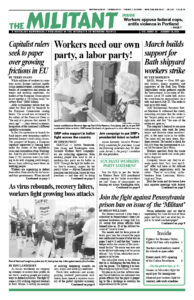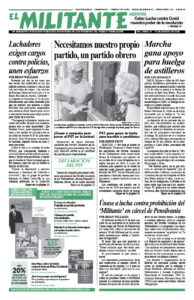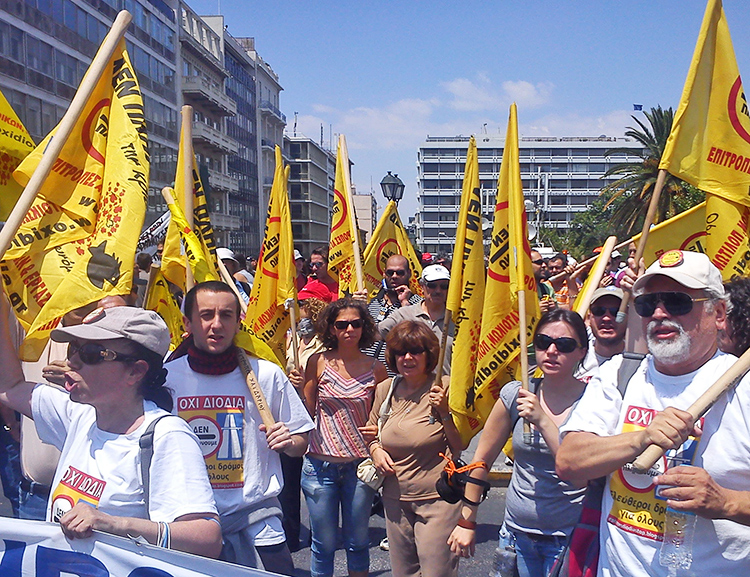While millions of workers in countries across Europe confront rapidly rising unemployment, continuing outbreaks of coronavirus and attacks on wages and working conditions, the leaders of the European Union agreed to put together a 750 billion euros “recovery fund” ($880 billion).
After acrimonious debate they decided the fund will be financed by the European Commission issuing bonds. The accord was acclaimed by the editors of the Financial Times as “the end of a process that started 70 years ago” — steps toward economic integration of the continent’s different capitalist economies.
In fact the agreement to launch the fund papers over deepening conflicts between Europe’s rival ruling classes. The prospect of forging a European capitalist superstate is coming apart under the strains of the worldwide crisis and competition from Washington. And the pact reached by officials from 27 EU member states has nothing to do with stopping profit-hungry bosses from inflicting more blows on working people.
Workers are organizing to defend themselves from attacks by the bosses and their governments. When aircraft manufacturer Airbus announced it was slashing 1,600 jobs, workers at eight of the company’s plants in Spain organized a one-day strike July 23. Thousands took to the streets of Budapest, Hungary, to protest the firing of the editor of a news website critical of the government of Prime Minister Viktor Orban. Almost all of the website’s staff resigned.
EU officials agreed to the new funding package after months of wrangling. Previously, the German rulers, the dominant power in the EU, had blocked all proposals for the European Commission to issue bonds, taking on additional debt. Instead, they had insisted individual EU member states facing financial difficulties be responsible for their own debt. The fund will finance grants and loans mainly to governments in southern Europe where the current crisis is felt most sharply.
Accelerating national differences
Differences between the capitalist economies of EU member nations have accelerated since government-imposed lockdowns began. According to EU officials, the German economy contracted by 9.7% between April and June.
Italy’s shrank by nearly 16%.
Some 12 million Italians, nearly half the workforce, have applied for relief payments from the government since the crisis began. As impoverishment among working people rises, organizers of food banks say they can’t keep up with requests for help.
“If southern countries go bankrupt we all go bankrupt eventually,” German Chancellor Angela Merkel said when the pact was announced, justifying her belated approval for the issuing of centralized euro-bonds. After Berlin acceded, the decision to “mutualize” the debts of the rival states was fiercely opposed by the wealthier ruling classes of Austria, Denmark, the Netherlands and Sweden. While a unanimous “agreement” was finally reached, these governments made clear they opposed any further moves to cover the debts of the governments of Greece, Italy and Spain.
Weeks ago the German rulers watched with alarm as rival governments in Beijing and Moscow offered aid to Italian authorities after Berlin refused to export desperately needed medical equipment to Italy at the height of the spread of coronavirus. Berlin’s indifference toward those living in Italy fueled antagonism there towards the EU, anger that has been percolating for years.
With the EU weakened by the January withdrawal of the U.K., Berlin and Paris are determined to halt further splits in the bloc.
The EU was set up as a rival to Washington and to perpetuate the domination within Europe of the strongest imperialist ruling classes, primarily in Germany and to a lesser degree France. It gave them access to a vast tariff-free market across the continent, and the ability to use European-wide protectionist measures against Washington. But the launch of the euro in 1999 prevented rivals of Berlin and Paris within the eurozone from being able to devalue their own now-defunct currencies — a step often used by crisis-hit governments to make exports cheaper than those of their competitors.
In the decade since the 2008 worldwide financial crash, Berlin and Paris have tried to protect their own economies by using the EU to intensify assaults on working people in southern EU member states, especially in Greece. They made loans to the government in Athens conditional on slashing jobs, pensions and the minimum wage. Successive Greek governments have acquiesced to the EU’s dictates, devastating the lives of millions.
Now working people in Italy are in the crosshairs.
New frictions built into accord
Getting access to the new “recovery fund” is conditioned on governments implementing “economic reforms” — EU doublespeak for deepening the exploitation of working people. Enforcing these terms will turn the crisis into an “opportunity,” EU Commission President Ursula von der Leyen declared.
Disbursement of the funds will also be subject to “regime conditionality,” more EU jargon aimed at pressuring member governments that frequently clash with EU officials, like those in Hungary and Poland, to back off if they want to get their hands on some cash.
No concrete decisions were reached at the summit on how to deal with the debt created by establishing the fund, aside from taxing plastic packaging, a measure that means working people will pay even more for groceries. Officials discussed but did not decide whether to raise funds by imposing more tariffs on imports from the U.S. and elsewhere.
Further conflicts between the EU’s rival governments are assured, as they compete over markets and resources, accelerating the disintegration of the protectionist trading bloc that has been underway for years.


